Table of Contents
Before bringing home a newborn child, you first prepare your home, baby-proofing every corner to ensure their safety. Similarly, you will want to take precautions before taking home an African Grey parrot. There are a number of factors you have to consider in order to create a safe environment for your pet bird and keep them away from household hazards.
Your home, unbeknownst to you, contains substances that might be safe for your but can be potentially toxic for your African Grey. And since parrots, and birds in general, are curious creatures, they tend to explore their surroundings a lot and thus may get themselves into dangerous situations around your home if you’re not careful.
If you want to keep your African Grey healthy and happy at home, watch out for these potential dangers.
Airborne Chemicals
Birds have the most efficient respiratory system in the world, but this comes at a price: they’re extremely sensitive to airborne chemicals and toxins. Several minutes of exposure to toxic air can cause a bird to keel over. Canaries, in particular, have been known to be particularly sensitive to carbon monoxide, to the point that they used to be utilized by coal miners to determine if the mine had poisonous gases.
Your African Grey, like all birds, have a respiratory system that is tremendously delicate. Scented candles and even most cleaning chemicals can be fatal to them. Keep your African Grey away from the room if you’re using these products, as well as aerosol sprays, perfumes, air fresheners, incense, and others with a strong scent.
If you’re using a non-stick pan, pot, and other such things marked with PTFE, keep your African Grey far too. These are deadly to birds; smoke from overheated Teflon is enough for them to collapse.
Sprays and Chemicals
Don’t spray any Household hazards chemicals like insecticides near your African Grey either. Just breathing in the fumes is dangerous. Make sure the air your African Grey is breathing in is clean and fresh.
If you’re planning to clean, ditch the chemical cleaners if possible and switch to natural alternatives. If this is not feasible, ensure that your African Grey is in a different room, preferably as far away from where the cleaning is happening as possible.
Smoking Sensitive
African Greys are also sensitive to smoke from cigarettes and nicotine or tobacco products. Even fumes left over from clothes can be toxic to them. If your hands have traces of nicotine and you decide to pet your African Grey regardless, then it may get dermatitis and other skin problems. If you want to smoke, do it far away from your African Grey and leave no trace of the smoke behind.
In cases when your Household hazards would have to be treated for pest infestations, and a ton of chemicals will be released in the air, it’s best to just relocate your African Grey for a few days. Before taking your parrot back home, make sure that all traces of toxins and fumes have been removed.
Electrical Cords
African Greys, and other birds, are famous nibblers, and whichever material they reach is fair game to them. Your African Grey may have fun while chewing, but it is fun that won’t last as it could have detrimental effects on its health. Regardless of whether the cords are plugged in or not, they are a huge hazard. Ensure that any cord is hidden away from your African Grey when you decide to let it fly around your home.
Ceiling Fans
Ceiling fans are helpful in ensuring that the air is flowing well throughout the room, but they are dangerous to African Greys especially when in use. Make sure to turn off your ceiling fans whenever your African Grey is flying around to prevent clipping its wings, which may cause it to get injured or even die.
Lead-containing Products
Products with lead, zinc, and cadium should be removed from your African Grey’s environment. These substances can be lethal to your parrot especially when ingested and not treated in time. Many household items contain these elements, so you have to be extra careful. Don’t leave pens and pencils unattended. Keep away lead-based paints, pennies, linoleum, foils, and jewelry.
Unattended Liquids
Your African Grey parrot may take a keen interest in water and other liquids like juice. It may fall into any of these liquids and drown itself. Don’t forget to cover up any source of water in the house when your African Grey is flying around. Close the lid on toilet bowls and don’t leave the bath unattended; better yet, close the door to all bathrooms. Make sure there’s no water in the sink or dishwasher either.
Also, don’t leave coffee or other caffeinated drinks lying around the house. Aside from drowning, these substances can cause cardiac malfunction in your African Grey when ingested too.
African Greys are intelligent, curious, and affectionate creatures. They deserve a loving home, and you can start providing that for them through foresight and carefulness. Ensure that they’ll have a safe, trusting environment away from Household hazards so that they can keep you company for a long time.

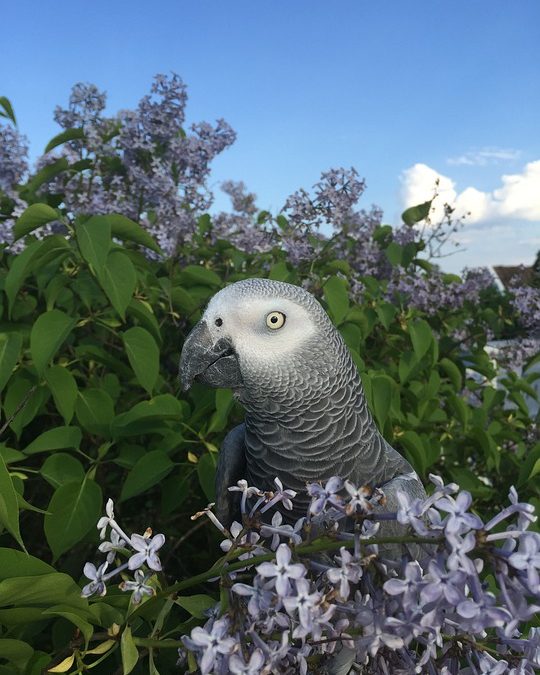
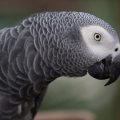
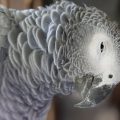
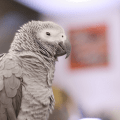
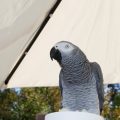
 Author and long-time animal lover. Sharing knowledge on pet care through experience and the written word.
Author and long-time animal lover. Sharing knowledge on pet care through experience and the written word.